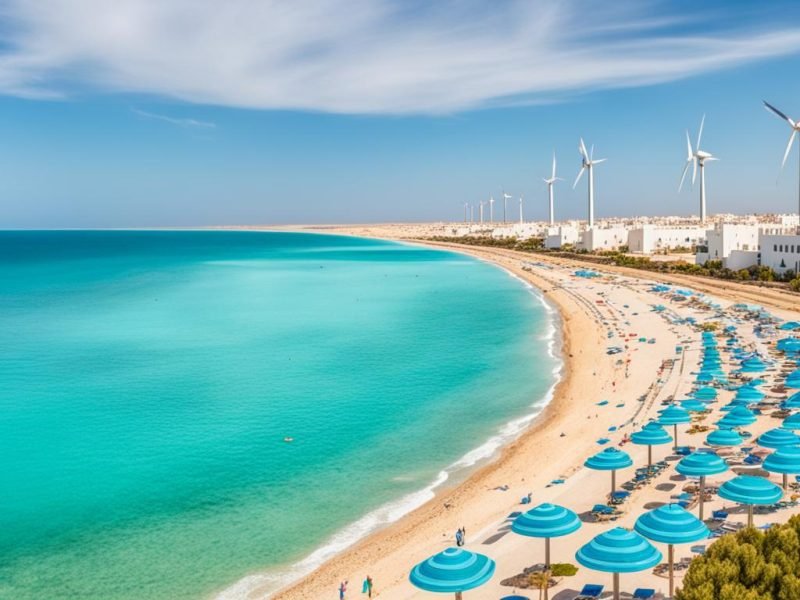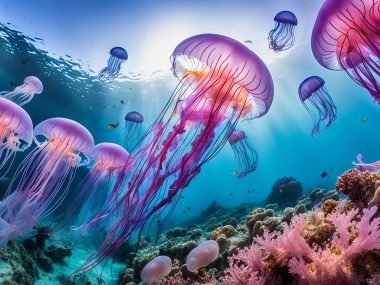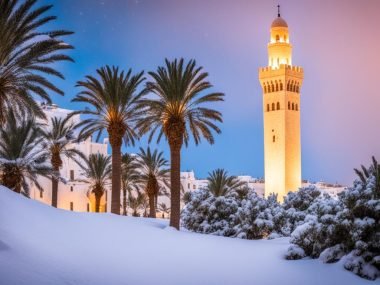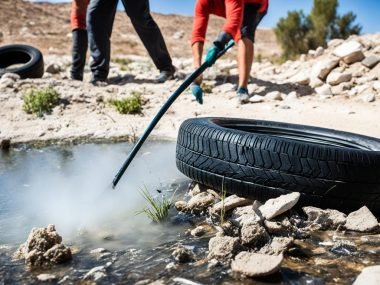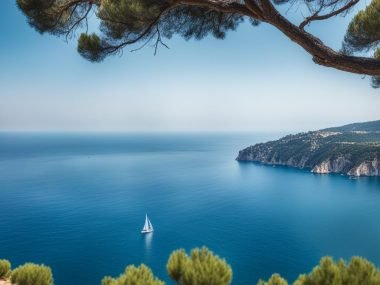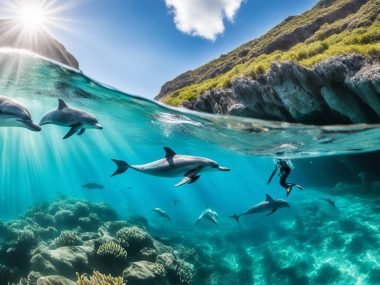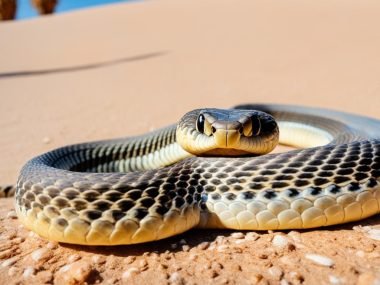Tunisia is pretty special. It’s small but has the world’s fifth-largest phosphate. It’s full of natural wonders that help its economy grow. Among these are big petroleum reserves and a booming farm sector.
I want to explore what Tunisia has underground and in its fields. We’ll look at minerals, energy, and farming. Knowing about Tunisia’s natural goodies is crucial. They play a big part in its growth and place in the world. So, let’s dive into Tunisia’s rich resources, from past finds to now.
Key Takeaways
- Tunisia holds the fifth-largest phosphate reserves globally.
- Petroleum reserves have shaped Tunisia’s economic landscape since the mid-20th century.
- Tunisian minerals include zinc, lead, barite, and iron.
- Agriculture, particularly olive cultivation, is a cornerstone of the economy.
- Natural gas production from fields such as Miskar significantly contributes to the energy sector.
- Tunisia’s fishing industry primarily sources from the Mediterranean Sea.
Overview of Tunisia’s Natural Resources
Tunisia is in North Africa, with Algeria West and Libya Southeast. Its north touches the Mediterranean Sea. This Tunisia geographical location shapes its climate and natural resources.
Geographical Location and Climate
Its coast enjoys a Mediterranean climate, great for farming. Inland areas have a semi-arid climate. The Mediterranean Sea helps keep temperatures mild. It also supports Tunisia’s economy by offering sea routes.
Historical Context of Resource Discovery
Tunisia resource discovery history began around the mid-20th century. The big moment was finding oil in Al-Burmah in 1964. Tunisia started exporting oil then. Phosphate mining has also been important, supporting its chemical and fertiliser sectors.
| Resource | First Major Discovery | Economic Impact |
|---|---|---|
| Petroleum | 1964 | Transformed Tunisia into an oil-exporting country |
| Phosphate | Early 20th century | Boosted chemical industry and fertiliser production |
Petroleum Reserves in Tunisia
Tunisia has important but small petroleum reserves. Its oil business helps the country’s economy. Key oil fields like Al-Burmah, Al-Dūlāb, Sīdī al-Yatāʾim, Ashtart, and Tazarka are vital. Their use, starting in the 1980s, was a key moment for Tunisia’s oil.
Major Oil Fields
Al-Burmah is a big player in Tunisia’s oil field. Al-Dūlāb and Sīdī al-Yatāʾim are also important for oil output. Ashtart and Tazarka, though smaller, add to the oil production mix. Together, they are crucial to Tunisia’s oil and resource plans.
Production Trends and Economic Impact
Over the years, Tunisia’s oil industry has changed a lot. It aimed for self-sufficiency in gas and sought foreign money. British investment in the mid-1990s was key. It brought money and technology, boosting production.
The economic impact of Tunisia petroleum is huge. It builds infrastructure, creates jobs, and increases the national GDP. Better production methods and management help Tunisia make the most of its oil.
Tunisia’s Phosphate Industry
The Tunisia phosphate industry is very important for the country’s money-making. It has always been vital in Tunisia’s economic story. This industry is key for Tunisia in the world market.
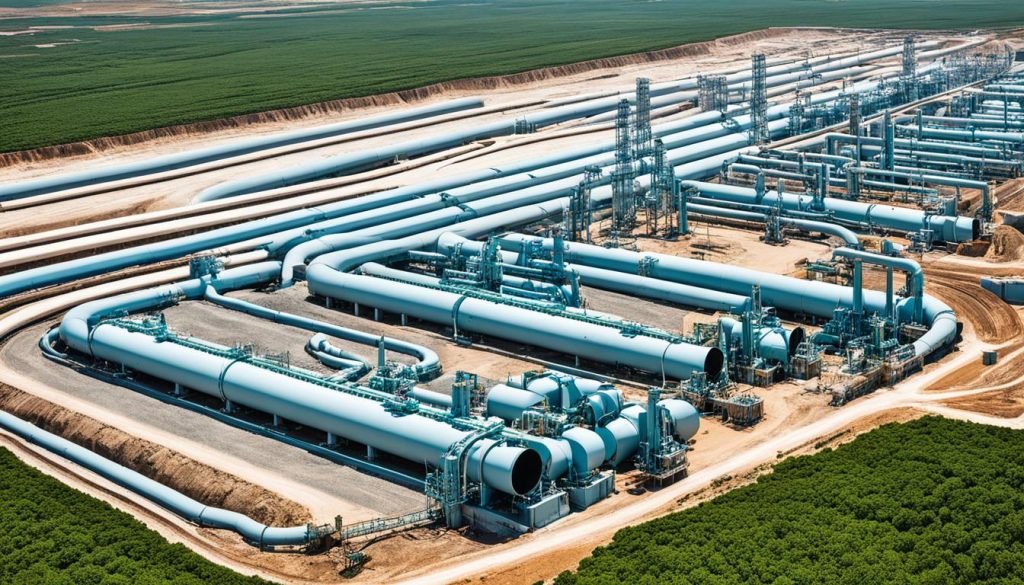
Historical Significance
The historical importance of Tunisia’s phosphate started in the early 20th century. That’s when its huge reserves were found. Since then, it has helped the country earn more money. It has boosted the chemical sector and fertiliser making.
Setting up the extraction of phosphate early on helped Tunisia grow. It made Tunisia a big name in the phosphate world.
Current Production and Export Markets
Nowadays, the phosphate production in Tunisia is still going strong. This brings big benefits to the economy. Tunisia sends phosphate to places in Europe, Asia, and Africa. But, it’s tough to keep up because the world market changes a lot.
Updating how they produce and send out phosphate is key. This will help the industry last longer and keep Tunisia’s economy stable. The Tunisian export markets for phosphate products are very important for its plans.
| Year | Production Volume (Million Tonnes) | Major Export Destinations |
|---|---|---|
| 2018 | 4.1 | France, India, Brazil |
| 2019 | 4.8 | Spain, Indonesia, Egypt |
| 2020 | 4.2 | Italy, Japan, Turkey |
Tunisian Mining Industry: Lead, Zinc, and Iron
The Tunisian mining industry is very important for the country. It helps a lot by getting lead, zinc, and iron from the ground. These minerals are used in many things we need every day. Tunisia is a big deal in the world because of its minerals.
Key Mining Locations
There are places in Tunisia that are really good for mining. Gafsa and Metlaoui are two of them. They are famous for having lots of minerals. Djerissa and Bougrine are also important because they have lots of iron and zinc. These places help Tunisia give minerals to the whole world.
Economic Contributions
Mining in Tunisia makes a lot of money for the country. It creates jobs and helps other businesses too. But sometimes, there are problems like not having enough raw materials. People are working hard to solve these problems. They want the mining industry to do even better.
Natural Gas Production in Tunisia
Tunisia has seen a big boost in natural gas production recently. This is thanks to foreign money coming in. These changes have made Tunisia more self-sufficient in energy.
One big step was developing the Al-Miskar field by British Gas. It helps meet local needs and lets Tunisia sell gas abroad too. The Al-Miskar field proves how great Tunisia can be with the right partnerships.
Natural gas is very important for Tunisia’s energy plans. As industries grow, the need for gas does too. Using new tech and exploring more will make gas production better.
With ongoing investment and new technology, Tunisia can produce even more gas. This will make the energy sector strong and varied. It’s good for the future economy.
What Natural Resources Does Tunisia Have in the Agricultural Sector?
Tunisia’s farms are very important to its economy. The good climate and fertile soil help grow lots of Tunisian agriculture products.
The Importance of Arable Land
A lot of Tunisia’s land is used for farming. This makes farming very important for the country’s money and food. The land is good for growing many kinds of crops.
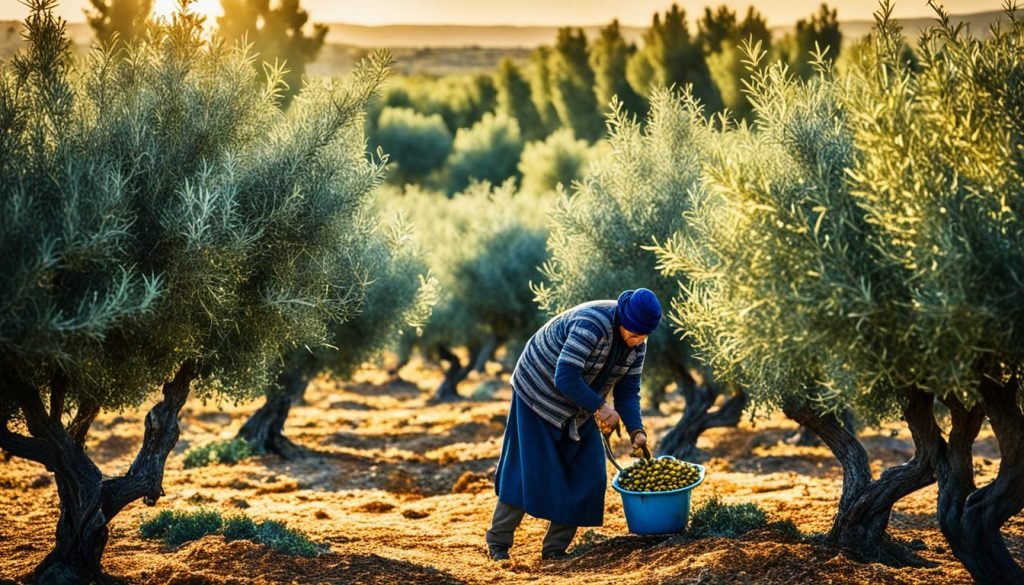
Crops Grown: Olives, Tomatoes, Citrus Fruits
Olives and tomatoes are very important in Tunisia. Tunisian olives are famous around the world. Tunisians also grow a lot of tomatoes, which they use in many dishes.
Let’s look at some important crops:
| Crop | Importance | Primary Use |
|---|---|---|
| Olives | High | Oil Production, Culinary |
| Tomatoes | Moderate | Culinary, Processing |
| Citrus Fruits | Low | Consumption, Export |
Citrus fruits also play a part, adding variety. They help in both local shops and markets abroad. This shows Tunisia is great at farming.
Tunisia’s Fishing Industry
Tunisia’s fishing thrives because of the Mediterranean Sea. The sea is full of various fish like sardines, mackerel, and grouper. This has helped Tunisia’s economy a lot.
Aquaculture in Tunisia is growing slowly. But, the sea’s fish are still the main support for fishermen. They combine old methods with new ones. This secures seafood for Tunisia and other countries.
3 Key Aspects Elevating Tunisia’s Fishing Industry:
- Economic Contribution: Fishing creates jobs and helps the economy. It reduces jobless rates by the sea.
- Resource Sustainability: Local and global groups work to keep fishing sustainable. This protects the fish.
- Diverse Marine Life: The Mediterranean’s many fish types boost trade. This makes the seafood market lively.
Tunisian Renewable Energy Potential
Tunisia has been working hard on its renewable energy lately. It is now using more solar and wind energy. This helps make a cleaner future possible.
Solar Energy Initiatives
Tunisia gets a lot of sun, which is perfect for making solar power. It has started many solar projects. These include building big solar power plants like the Tozeur Solar PV Project.
Investment in Wind Energy
Tunisia is also putting a lot of money into wind energy. Its plan includes both solar and wind projects. They’re building wind farms in different places. This will help Tunisia use more green energy by 2030.
All these efforts in renewable energy are really important. They’re good for the planet and can also create jobs. This is a big move towards a better future.
Environmental Challenges and Sustainability Efforts
Tunisia has big environmental problems that harm its nature and future. Deforestation, soil loss, lack of water, and dirty air and water are critical. They need quick and smart actions.
Deforestation and Soil Erosion
Too many trees are being cut down in Tunisia. This causes loss of plants and animals and more soil erosion. Farms growing, illegal tree cutting, and city building are hurting Tunisia’s forests. Stopping deforestation with new trees and taking care of the land is key.
Soil loss makes farming hard and hurts nature. To fix this, Tunisia is trying things like farming on slopes, mixing trees with crops, and using plants to cover soil.
Water Scarcity and Pollution
Not having enough water is a big problem in Tunisia. It happens because of changing rains, taking too much underground water, and not using water well in farms. Saving water with drip systems and catching rainwater is a must. The government and groups are making plans for better water use.
Dirty water is harmful to health and the earth. Tunisia is working to manage rubbish better and clean dirty water. This will make water and air cleaner.
Making things better also means using laws and putting money into clean energy. Growing the economy in a green way is important.
| Challenge | Causes | Solutions |
|---|---|---|
| Deforestation | Agricultural expansion, illegal logging | Reforestation, sustainable land management |
| Soil Erosion | Deforestation, improper farming practices | Terracing, agroforestry, cover crops |
| Water Scarcity | Over-extraction of groundwater, inefficient use | Drip irrigation, rainwater harvesting |
| Pollution | Untreated sewage, inadequate waste disposal | Wastewater treatment, improved waste management |
Conclusion
Tunisia has used its many natural gifts to grow its economy. This includes oil, minerals, farming, and fishing. Yet, managing these gifts means taking care of the environment too.
For a brighter future, Tunisia is turning to energy from the sun and wind. This reduces harm to our planet. It’s also tackling issues like not enough water, pollution, and losing forests.
Tunisia must keep improving how it looks after its resources. This way, it can keep its economy strong and protect nature. Smart management of resources is key to this balance.

